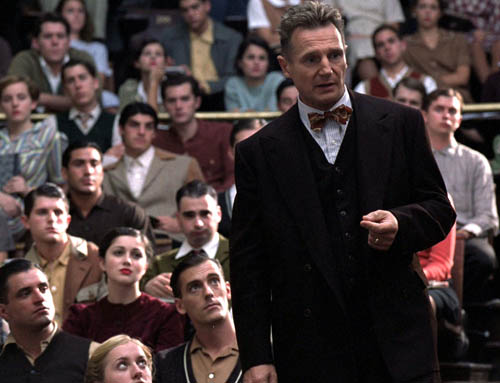Alfred Kinsey has been dead for 48 years, and he still makes people mad. “Kinsey,” a movie inspired by the life of the sex researcher, hasn’t even opened, and here is an AP story about “indignant conservative groups” who think it is propaganda for the sexual revolution.
Kinsey is partly responsible for her generation “being forced to deal face to face with the devastating consequences of sexually transmitted diseases, pornography and abortion,” Brandi Swindell, head of Generation Life, told the Associated Press. And here is Robert Knight, director of Concerned Women of America’s Culture & Family Institute: “Instead of being lionized, Kinsey’s proper place is with Nazi Dr. Josef Mengele or your average Hollywood horror flick mad scientist.”
Strong words about a man who never advocated anything and specialized in research that simply attempted to discover what people actually do in their sex lives. Before Kinsey, it was generally believed that hardly anyone was homosexual, that masturbation could cause madness, that American married couples seldom strayed from the missionary position and rarely had sex before or outside of marriage. Kinsey found that most people masturbated, that a third of men reported at least one homosexual experience, and that oral sex and extramarital sex were commonplace.
Those who don’t want to believe those findings, or think they shouldn’t have been revealed even if true, find Kinsey’s statistics devastating, and blame them on Kinsey, as if he made them up.
“The forces of prudery come back in waves every other generation or so,” Liam Neeson thinks. He plays Kinsey in the movie, which opens Friday. “In Kinsey’s time, America was confused sexually, and it’s still confused. We have a situation where millions of people bemoan the fact that a wonderful show like ‘Sex and the City’ goes off the air; it’s about four women talking about sex in a very indelicate fashion, to put it very mildly. And yet images of two gays kissing after they get married provoke outrage.”
Neeson’s performance, which seems likely to win an Oscar nomination, shows Kinsey as a scientist obsessed by his work. Before he began cataloging human sexual behavior, he collected and studied a million gall wasps, and in both cases he observed, recorded, and reported what he found. Nobody got mad about the wasps.
“He had an extraordinary manner when he conducted interviews,” Neeson told me. This was one night in October, when we had dinner after he introduced “Kinsey” at the Chicago International Film Festival. “He devised his questions over two or three years, and it took his research assistants a year to learn them; there was a minimum of 288 questions and a maximum of 800, and they had to memorize them all.
“I gather he could be brusque and cold, but in his interviews, he exuded warmth, and he was absolutely non-judgmental when asking people the most personal questions about sexuality. Apparently people came out of the room feeling charged in some way, having gone through some extraordinary spiritual process by being honest about themselves. Kinsey did nearly 8,000 interviews, and the whole team did 18,000 over a period of 18 to 20 years.”
For Neeson, “Kinsey” was a chance to play another character like his famous Michael Collins or Oskar Schindler: “I love people with so much energy and commitment that sleep gets in the way of their destiny.”
The fascinating thing about Kinsey, he said, was that “he asked people the most intimate, probing questions without any sense he might be offending or even bothering them. That actually allowed some of his subjects to relax, because he seemed so dispassionate.”
He was bullheaded, Neeson said, and he upset people: “They were looking for a way to shut him down. The McCarthy era was starting, and after they finished with the communists, of course they went for Kinsey.”
In the movie, Kinsey is so focused as to seem monomaniacal. He got into trouble with congressional critics and lost his funding from the Rockefeller Foundation because he bluntly said what he believed without the slightest regard for public relations.
“Kinsey was intent on separating science from morality,” Bill Condon told me during the same dinner. He wrote and directed the film, his first since directing “Gods and Monsters” (1998) and writing “Chicago” (2002). “You have to do that when you study sex, because it’s so connected to religion, culture and people’s idea of morality. If you look around today, whether it’s sex education or the stem cell debate, people are trying to impose an agenda on something that should be entirely scientific.”
Condon said he gets unhappy when people say that Kinsey “believed” or “thought” something: “He drew his conclusions from actual research. It wasn’t an opinion.”
Although Kinsey’s critics blame him for changes in the sexual climate, “he would have been horrified by the gay movement or the women’s movement. These were movements that in some ways he created, but he didn’t believe in people defining themselves simply by sexual activity.”
He felt sexual definitions were “pretty fluid, anyway,” Condon said, with most people falling somewhere along Kinsey’s famous 0-to-6 scale from straight to gay.
The AP story quotes Tom Neven of Focus on the Family, a Colorado ministry: “To say that [the movie] is rank propaganda for the sexual revolution and the homosexual agenda would be beyond stating the obvious.”
Condon’s opinion: “I think it’s nice to remind people that Kinsey was first and foremost a scientist. He’s become such a hot-button figure and a demon for some. Certain groups think if they can somehow discredit the man, the science will be discredited, and therefore everything that’s come as a result of that science will be undone. That’s a fool’s errand.”












